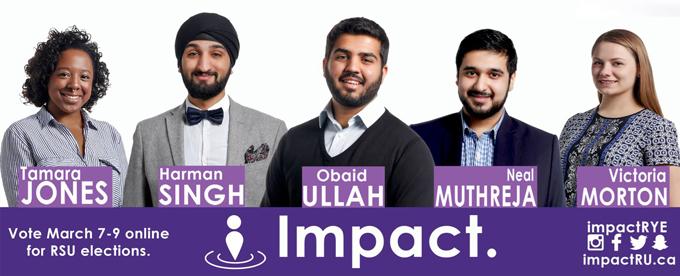By: Keith Capstick
After a year of political turnover in the Ryerson Students’ Union (RSU) under the Transform Ryerson slate, this year’s incumbent team for the RSU elections is Impact Ryerson. An Impact executive would feature two returning executive members, Obaid Ullah, who is running for president, and Harman Singh, who is looking to return to his position as vice-president student life.
According to Ullah, the slate was founded on the premise of connecting students to their academics. He says he looked to find board candidates that were heavily involved in their faculties, rather than high-ranking student leaders. Impact will be looking to lobby for better transit services, increased mental health services on campus and a higher number of hands-on learning experiences across multiple faculties.
Impact has stressed the importance of improving transparency with the membership throughout their campaign.
“If you are being scrutinized and if you have people yelling at you that you’re not transparent enough, then you’re not. Then [we] need to change what [we’re] doing. [We] need to listen to the students who are my boss,” said Victoria Morton, the slate’s candidate for vice president education.
This election marks the second consecutive year that the RSU will be contested by two full slates after a four-year gap from 2011 to 2015 where only one slate ran. Prior to Transform’s victory last year, groups affiliated with their opposition, RU Connected, held office for nearly a decade. With the rise of Transform and now Impact there is now clear contest for the RSU after the usually named “Unite” slates, whose platforms align closely with Canadian Federation of Students’ (CFS) initiatives, had a near monopoly on the government for so long.
As the incumbent slate, Impact has been fielding questions throughout their campaign about many of the issues their predecessors have faced. At the March 3 all-candidates debate, the executives were asked about Transform’s “restructuring” process that resulted in the layoff of Gilary Massa, their spending on parade and picnic and the RSU’s relationship with the equity service centres.
Impact’s candidate for vice president equity, Tamara Jones, said that she couldn’t comment on the decision of the current RSU executive, but did say her heart goes out to Gilary and that students should have been more involved in the decision.
“There are things I wish were done differently. The human rights aspect, it looks really bad on the RSU. It looks horrible. And I think that my issue with everything that happens within the RSU is that there’s no transparency, and that doesn’t work for me,” said Jones.
Jones also addressed the RSU’s relationship with the equity centres and said that it’s the duty of the vice-president equity to spearhead the progress in the relationship. She also said that she’d like to start an equity-based publication to allow the centres to share their experiences in a creative way.
“It’s on VP equity to see if we can raise money in other ways outside of campus. I want to see if events for the equity centres could be sponsored. I’d reach out to see if we could get [more] sponsorship or ad revenue,” said Jones. “I’m interested in reaching out to other corporations, other student groups, seeing if they’d want to work to fund or donate.”
Impact has also stressed the importance of increased mental health support at Ryerson throughout their entire platform. Jones says that it’s her top priority to educate faculty on how to fight the stigmas that surround mental health issues on campus.
Finally, Morton stressed the importance of not being a “one issue candidate” and said that it’s important that Impact is able to broaden its campaign focus more so than this year’s RSU.
Voting will take place on March 7, 8 and 9 at various public locations on campus and online in your my.ryerson.ca account.












Leave a Reply